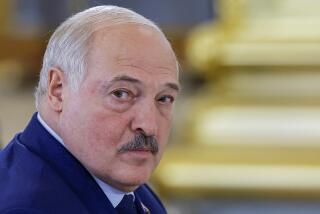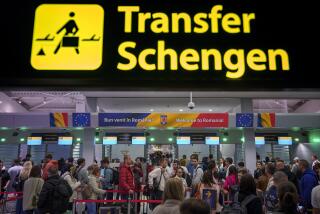Power Over Visas Won by Lithuania : Baltics: Accord with Moscow provides that visitors can enter breakaway republic without Soviet document.
- Share via
VILNIUS, Soviet Union — In a tangible sign that the Kremlin accepts that Lithuania is on the road to independence, officials from Moscow and the Baltic republic on Wednesday signed an agreement making a Lithuanian-issued visa the only requirement for entry into the republic.
The agreement, signed for the central government by a deputy chairman of the Soviet KGB, Gen. Ivan Fedofeyev, provides that from today on, visitors can enter Lithuania without a Soviet visa, said Audrius Butkevidius, director of the republic’s National Defense Department.
“This is a big step,” said Butkevidius, who signed for Lithuania. “But we have not yet reached our goal.”
For now, Soviet border guards will stand with their Lithuanian counterparts at the border, but they will be under orders to follow Lithuanian law, Butkevidius said. Within a month, Lithuania wants its own guards alone on its borders, he said, and Wednesday’s agreement provides for that as soon as the republic is ready to take full control.
The border agreement was just one small example of how last week’s failed coup attempt by hard-liners in Moscow has given a major boost to the cause of Lithuanian independence. Under international law, control of national borders is a crucial test of a country’s independence.
Since the putsch was put down, at least 27 foreign countries, including the 12 European Community nations, have either recognized or announced their intention to recognize the independence of Lithuania and the two other Baltic republics, Latvia and Estonia.
Lithuanian officials said they were not concerned that the United States is not yet among the nations that have recognized their independence.
“It’s not a real barrier,” Lithuanian President Vytautas Landsbergis told reporters. “We can wait a little more.”
The symbolic and tangible strides that the small republic has made toward independence in the days since the coup attempt has made the people’s heads spin.
A huge statue of the Soviet state’s founder, V. I. Lenin, that had stood in downtown Vilnius as a constant reminder of the Kremlin’s 1940 annexation of Lithuania and its stubborn refusal since to let the republic go, was dismantled a few days ago.
Vilnius’ main broadcasting tower, which in January was stormed by Soviet troops, leaving 14 dead, has been given back to the Lithuanians, as has the city’s main printing house.
Also, in the space of a few days, Butkevidius’ office has forced the Soviet military and KGB, two bastions of Soviet power, to abandon their headquarters in Vilnius.
Butkevidius said Lithuania plans to reopen a rail line to Poland that was closed in 1945 and to open two more highway border crossings between Lithuania and Poland.
In Riga, capital of neighboring Latvia, Wednesday also brought signs of a world turned topsy-turvy. About 150 once-feared Soviet Interior Ministry troops who killed five Latvians in a January raid on the republic’s Interior Ministry demanded amnesty and safe passage out of the republic for themselves and their families, according to the Associated Press.
In a statement, the so-called “black berets” said that agreement to their demands today would prevent “inevitable violence,” AP reported. Rolands Blezurs, adviser to Latvian Vice President Dainis Ivans, interpreted the statement as an ultimatum, the AP report said.
While Butkevidius was meeting with KGB officials, President Landsbergis was talking with Lt. Gen. Valery Mironov, the new commander of Soviet troops in the Baltics, about withdrawing those troops from the republic, releasing Lithuanian conscripts in the Soviet armed forces and closing conscription offices.
Mironov said he does not have the authority to negotiate a troop pullout, according to Landsbergis, but he agreed to close down the conscription offices and to help bring Lithuanian soldiers back home.
“This shows that the new military commander has a new attitude and that there’s a very heavy influence from the Russian (Federation) government,” which has already recognized Lithuania’s independence.
Landsbergis and other Lithuanian officials said the withdrawal of Soviet troops will be a major issue in the immediate future. The size of the Soviet military contingent in the three Baltic republics has not been publicized, but it is estimated to number more than 100,000.
“As for the withdrawal of the army, I think it has to begin this year,” Landsbergis told a news conference. “But I don’t think it is really realistic to expect the army to completely withdraw from here until it withdraws from Germany.”
Soviet troops are scheduled to withdraw from what used to be East Germany by 1994.
Algimantas Cekuolis, an adviser to Landsbergis and editor of the weekly newspaper Gintafis Krastos, said that unless the Red Army pulls out, Lithuania will not be completely free no matter how many countries recognize it.
“While we have foreign troops on our soil, it’s hard to feel exactly free,” Cekuolis said.
Although Lithuanians long for a complete pullout, even a start will be a great relief, he said.
“The very minute the status of Soviet troops is established, (that the) troops (are) here just on a temporary basis, then it will be OK,” Cekuolis said. “You don’t hear people saying that Germany is not independent, although there are still lots of Soviet troops there.”
For now, the advances of the last week have already given Lithuanian officials the feeling that they are dealing with a totally new breed of Soviet official. The influence of Russian Federation President Boris N. Yeltsin’s liberal policies are obvious, they say.
Butkevidius said the KGB officials who met with him “were the most pleasant KGB people I have ever met in my life.
“But of course, we can’t trust them--they’re still KGB,” he added.
More to Read
Sign up for Essential California
The most important California stories and recommendations in your inbox every morning.
You may occasionally receive promotional content from the Los Angeles Times.













